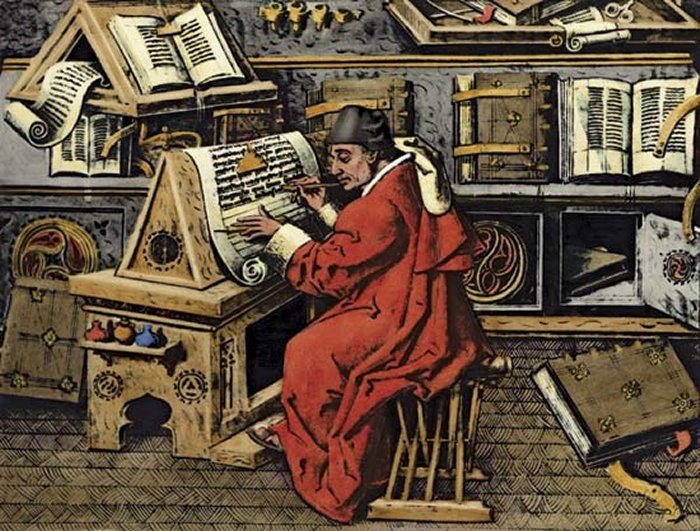Why Did First Printed Books Scare Ancient Scholars In Europe?
Ellen Lloyd - AncientPages.com - Johann Gutenberg’s brilliant printing press changed Europe’s history. People were excited when the first printed books started appearing in Europe. Thousands of titles were now available, and more and more people could buy previously rare and expensive books.
However, though Gutenberg’s printed press was appreciated by most, some considered the mass distribution of printed books dangerous. Several scholars were against the printing press. So, why did the first printed books scare scholars in Europe?
Left: Gutenberg's printing press was appreciated by many, but far from all. Right: Johannes Gutenberg (1400-1468), Public Domain
We should not forget that Johannes Gutenberg did not invent the printing press. He contributed to movable type mechanical printing technology in Europe in 1450. Chinese and Korean inventors produced printed books for centuries before Gutenberg was born. The world’s first known movable type printing was a Chinese invention.
Gutenberg adapted the technology for a Western market and turned it into a publishing empire.
On February 23, 1455, Europe’s first mass-produced book – the Gutenberg Bible – was printed with movable type in Mainz, Germany. The book was a Latin language Bible.
Gutenberg’s printing press helped to popularize books and the information they contained.
His invention revolutionized the distribution of knowledge by producing many accurate copies of a single work.
Scholars Believed That Too Much Knowledge Was Dangerous To Ordinary People
To many scholars, the easy distribution of knowledge was a problem. One scholar who spoke against Gutenberg’s printing press was Conrad Gessner (1516-1565), a Swiss physician, naturalist, bibliographer, and philologist.
Gessner was, in many ways, an outstanding scholar and wrote several books, but he certainly didn’t like the printing press. Gessner created a list of all books published with the help of Gutenberg’s printing press over 100 years, and it contained as many as 10,000 titles accessible to readers in Europe.
According to Gessner, this was shocking, absurd, and dangerous. Gessner’s argument against the printing press was that ordinary people could not handle so much knowledge.
William Caxton shows his printing press to King Edward IV. Credit: Prepressure
Gessner demanded that those in power in European countries enforce a law regulating the sales and distribution of books. He felt ordinary people should not have access to such many books. Gessner was not a person who hated books. On the contrary, according to a legend, he wished to spend his last day in a library, a place he loved, and at the time of his death, he had published 72 books and written 18 more unpublished manuscripts.
Gessner was not the only one who was annoyed with the printing press. Several scholars shared his views. One of them was Adrien Baillet (1649 – 1706), a French scholar and critic who is best known for his biography of Descartes. Baillet believed that all views presented in books would divide Europe. In a work entitled "Jugemens des savants sur les principaux ouvrages des auteurs", Baillet wrote: “We have reason to fear that the multitude of books that is increasing every day in a prodigious manner will put the centuries to come into as difficult a state as that in which barbarity had put the earlier ones after the fall of the Roman Empire."
Gutenberg’s Printing Press Left Monks Unemployed
Prior to the invention of printing, press books were produced by hand. Large monasteries had rooms called scriptoria, where monks would copy manuscripts. The process of producing a book was time-consuming. For example, the Bible was copied by hand, and it would take a single monk 20 years to transcribe it.
Prior to Gutenberg's printing press monks were responsible for writing. Credit: Walking in the Desert
German Benedictine abbot Johannes Trithemius (1462 – 1516) was very concerned that thousands of monks responsible for writing would be left with nothing to do. In his work In Praise of Scribes, Trithemius wrote: “If writing is inscribed on parchment, it will last a millennium. But if it is on paper, how long will it last? Two hundred years would be a lot." He urged the scribes to “perpetuate in writing the useful products of the press.”
Interestingly, Trithemius had nothing against that his writings were published with the help of Gutenberg’s printing press.
To many scholars and theologians, Gutenberg’s printing press was a threat. It was said books would divide Europe, create chaos, harm peoples' knowledge, and monks would be without work.
For all of us who love books, it’s a good thing the printing press survived despite the fierce opposition.
Updated on October 24, 2023
Written by - Ellen Lloyd – AncientPages.com
Copyright © AncientPages.com All rights reserved. This material may not be published, broadcast, rewritten or redistributed in whole or part without the express written permission of AncientPages.com
More From Ancient Pages
-
 Mysterious Death Of 20 Celts Who Died 2,000 Years Ago In The Three Lakes, Switzerland – Re-Examined
Archaeology | Jun 17, 2024
Mysterious Death Of 20 Celts Who Died 2,000 Years Ago In The Three Lakes, Switzerland – Re-Examined
Archaeology | Jun 17, 2024 -
 Death Of Kvasir And How Famous Mead Of Poetry Was Created, Stolen And Finally Recovered By Odin
Featured Stories | Apr 14, 2018
Death Of Kvasir And How Famous Mead Of Poetry Was Created, Stolen And Finally Recovered By Odin
Featured Stories | Apr 14, 2018 -
 20 Mummies Discovered In Greco-Roman Tombs In Aswan, Egypt
Archaeology | Jan 21, 2022
20 Mummies Discovered In Greco-Roman Tombs In Aswan, Egypt
Archaeology | Jan 21, 2022 -
 Manticore – Legendary Persian Sphinx Whose Existence Is Still Discussed
Featured Stories | Jun 4, 2019
Manticore – Legendary Persian Sphinx Whose Existence Is Still Discussed
Featured Stories | Jun 4, 2019 -
 Something Strange Happened To Our Ancestors 900,000 Years Ago – Genetic Study Reveals
DNA | Sep 1, 2023
Something Strange Happened To Our Ancestors 900,000 Years Ago – Genetic Study Reveals
DNA | Sep 1, 2023 -
 Mystery Of The Royal Tombs At Vergina Deepens – Has Alexander The Great’s Sacred Purple Tunic Been Found Inside?
Archaeology | Oct 28, 2024
Mystery Of The Royal Tombs At Vergina Deepens – Has Alexander The Great’s Sacred Purple Tunic Been Found Inside?
Archaeology | Oct 28, 2024 -
 12 Ancient Myths, Legends And Biblical Stories Confirmed By Modern Science
Featured Stories | Apr 22, 2017
12 Ancient Myths, Legends And Biblical Stories Confirmed By Modern Science
Featured Stories | Apr 22, 2017 -
 Ancient Mystery Of The American Southwest – Secrets Of The Cliff Dwellers – Part 1
Ancient Mysteries | Jul 23, 2018
Ancient Mystery Of The American Southwest – Secrets Of The Cliff Dwellers – Part 1
Ancient Mysteries | Jul 23, 2018 -
 What Can Archaeology Tells Us About Climate Change?
Archaeology | Aug 9, 2021
What Can Archaeology Tells Us About Climate Change?
Archaeology | Aug 9, 2021 -
 Neanderthal Extinction May Have Been Caused By Sex, Not Fighting – New Study Suggests
Archaeology | Nov 1, 2022
Neanderthal Extinction May Have Been Caused By Sex, Not Fighting – New Study Suggests
Archaeology | Nov 1, 2022 -
 Evidence Foreigners Fought Alongside Ancient Greeks Is Challenging Millennia Of Military History
Featured Stories | Jun 1, 2022
Evidence Foreigners Fought Alongside Ancient Greeks Is Challenging Millennia Of Military History
Featured Stories | Jun 1, 2022 -
 What Are The Most Common Misconceptions About Pirates?
Ancient History Facts | Apr 16, 2024
What Are The Most Common Misconceptions About Pirates?
Ancient History Facts | Apr 16, 2024 -
 Archaeological Enigma On The Træna Islands – What Happened To The Local Community?
Archaeology | Nov 28, 2023
Archaeological Enigma On The Træna Islands – What Happened To The Local Community?
Archaeology | Nov 28, 2023 -
 Surprising Connection Between Norse God Odin And Attila The Hun Revealed
Featured Stories | Dec 8, 2020
Surprising Connection Between Norse God Odin And Attila The Hun Revealed
Featured Stories | Dec 8, 2020 -
 A 4.4 Million-Year-Old Hand Of ‘Ardi’ Has Some Clues On Humans’ Upright Walking
Fossils | Feb 25, 2021
A 4.4 Million-Year-Old Hand Of ‘Ardi’ Has Some Clues On Humans’ Upright Walking
Fossils | Feb 25, 2021 -
 Pre-Columbian Pachacamac Site Dedicated To God Of Creation, Fire And Earthquakes In Inca Religion
Featured Stories | May 31, 2018
Pre-Columbian Pachacamac Site Dedicated To God Of Creation, Fire And Earthquakes In Inca Religion
Featured Stories | May 31, 2018 -
 How Gold Rushes Helped Make The Modern World
Featured Stories | Aug 1, 2019
How Gold Rushes Helped Make The Modern World
Featured Stories | Aug 1, 2019 -
 Surprising Mask Of A Human Face Found On Cistern Wall In The Ancient City Of Ptolemais
Archaeology | Jan 17, 2025
Surprising Mask Of A Human Face Found On Cistern Wall In The Ancient City Of Ptolemais
Archaeology | Jan 17, 2025 -
 Enigma Of San Bernardo Mummies That Refuse To Decompose
Featured Stories | Nov 7, 2018
Enigma Of San Bernardo Mummies That Refuse To Decompose
Featured Stories | Nov 7, 2018 -
 8,000-Year-Old Petroglyphs Discovered In Oldest Impact Crater In South Africa
Archaeology | Jun 21, 2019
8,000-Year-Old Petroglyphs Discovered In Oldest Impact Crater In South Africa
Archaeology | Jun 21, 2019



